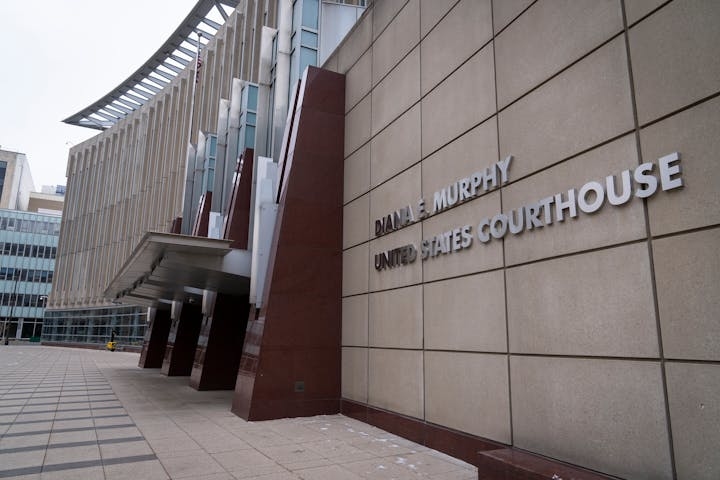Workers at or near alleged food distribution sites in Owatonna, Shakopee, Lexington, St. Paul and Minneapolis testified in federal court Tuesday that they didn’t see the thousands of meals claimed to be given out in those places during the COVID-19 pandemic.
Six witnesses continued testimony supporting prosecutors’ allegations that seven defendants on trial, all with ties to the nonprofit Feeding Our Future, didn’t serve thousands of meals to low-income kids but still drew millions of dollars in federal reimbursements.
“It’s just kind of outlandish,” said David Hamilton, who was the executive director of the Cedar Cultural Center in Minneapolis, which defendants listed as a food site drawing an average of 1,000 people a day for meals in March 2021. “There wasn’t that many people around. It was pretty desolate.”
Defense attorneys sought to cast scrutiny on the testimony by pointing out that the six witnesses — from housing property managers to a city administrator and a nonprofit leader — didn’t observe food distribution sites at all hours. They also presented witnesses with evidence such as a form a St. Paul apartment building signed to authorize a meal distribution there, and photos of lines of people receiving meals in Minneapolis.
“I never saw that,” Hamilton said, adding that the West Bank was largely empty in the pandemic.
Prosecutors allege that the six men and one woman on trial, who have ties to Empire Cuisine & Market in Shakopee, took advantage of the pandemic and inflated the number of meals they claimed to serve to kids in need. Instead, prosecutors allege they pocketed millions of dollars to buy luxury homes, cars and trips.
The trial is the first one since the FBI raided St. Anthony nonprofit Feeding Our Future more than two years ago. In all, 70 people have been charged or indicted in what prosecutors say is one of the largest pandemic-related fraud schemes in the country, totaling more than $250 million. Of the 70 people, 18 have pleaded guilty.
Defendants Said Shafii Farah, Abdiaziz Shafii Farah, Mohamed Jama Ismail, Abdimajid Mohamed Nur, Abdiwahab Maalim Aftin, Mukhtar Mohamed Shariff and Hayat Mohamed Nur are facing trial this month. They’ve been charged with wire fraud, money laundering and other crimes.
They collectively received more than $40 million for submitting claims for more than 18 million meals. Their organizations were overseen by Feeding Our Future and a St. Paul nonprofit called Partners in Nutrition, who handled paperwork for the U.S. Department of Agriculture-funded programs that reimburse schools, nonprofits and daycares for feeding low-income kids after school and during the summer.
Defense attorneys repeatedly questioned witnesses Tuesday about how their clients’ names didn’t show up on any of the meal program forms or checks that prosecutors displayed, pointing the responsibility to the leaders of Feeding Our Future and Partners in Nutrition who signed the forms instead. Plus, they added, many witnesses were first contacted by FBI agents and prosecutors recently, asked to recall memories from three or four years ago.
In Shakopee, Gretchen Hawk, a caretaker at an apartment building, testified that a Lutheran pastor delivered meals once in 2021, but she never saw any other groups dole out food. When asked if she saw 500 people on average every day who allegedly showed up at the food site, she said no, adding that as a resident, too, “I would’ve been aware of it.”
In the north metro, a small city park on the border of Lexington and Circle Pines that was fenced off under construction in 2021 was also listed as an food distribution site, claiming to give out 155,000 meals, for instance, in one month.
Lexington city administrator William Petracek said he never saw any meals distributed at the park, which is near city hall. On meal forms, the address listed was for a nearby strip mall, which has a Montessori school. Petracek said he never saw meals distributed at the strip mall or school, which he said had a suspended business license.
Defense attorneys questioned if residents from Blaine and other larger surrounding cities could’ve visited the meal site. In a close-knit city of 2,700 residents, Petracek said he would’ve noticed if thousands of people arrived to get free meals.
“That’s absurd,” Petracek said. “If we had that level of people … any place at all, our police officers probably would’ve stopped and questioned them … This absolutely did not happen.”
In Owatonna, two apartment and townhouse managers testified Monday that they never saw meals distributed at the complexes, which were also listed as meal sites. Erin Nelson said a truck did distribute bags of rice and canned goods one time at the complex she managed. But she couldn’t recall where the truck was from and never saw or heard from residents about any other food distributions at the townhomes, where defendants claimed to give out 35,000 meals in 2021.
A St. Paul apartment property manager, Julia Garcia, testified she never saw meal distributions except from schools. Under cross-examination, defense attorney Edward Sapone showed her an authorization form that her colleague signed for food distribution. Garcia said she didn’t see food distributed.
In Minneapolis, the Cedar Cultural Center was closed because of the pandemic and was being renovated in 2021 when Empire claimed to give out 62,000 meals in one month. Hamilton said he was there every day and never saw lines of people or trucks delivering meals.
Defense attorney Ian Birrell questioned if Hamilton had seen a truck near the alley delivering meals, showing him photos taken at an undisclosed time of people lining up next to the music venue. Hamilton said he never saw that. Birrell asked if he would’ve known about activity after work. Hamilton added that West Bank business owners message one another often, so he said he would have been told about it.
“That’s too many people for that area of the neighborhood,” he said. “I never heard about any meal service.”
